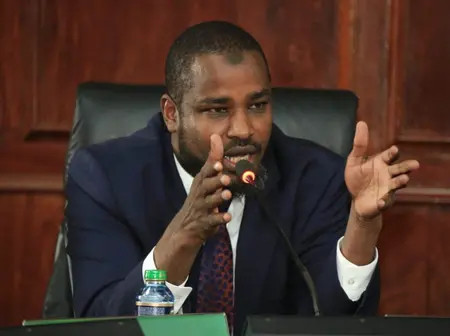Wajir West MP Farah Yussuf Mohamed has protested against what he terms a “discriminatory and selective” government plan to compensate victims of police brutality only up to 2017, excluding survivors of earlier atrocities such as the 1984 Wagalla Massacre.
In a hard-hitting letter dated September 29, 2025, addressed to President William Ruto and copied to former Prime Minister Raila Odinga, Farah accused the government of perpetuating injustice by sidelining historical victims from Northern Kenya who endured some of the country’s worst human rights violations.
“The selective approach to justice offends the principles of equality, fairness, non-discrimination and inclusivity as enshrined in the Constitution,” he wrote.
“By limiting compensation to only those affected up to 2017, the government is deliberately excluding victims of earlier and more egregious violations, most notably the Wagalla Massacre of February 1984.”
The Wagalla Massacre remains one of the darkest chapters in Kenya’s post-independence history. On February 10, 1984, thousands of Somali Degodia civilians in Wajir were rounded up by the Kenya Army under the guise of investigating a rebellion.
What followed was a horror tale: men were detained at Wagalla Airstrip for days without food or water. Many were tortured, some executed. Survivors recall being stripped naked, forced to lie on the tarmac under the scorching sun, and shot when they attempted to flee. Eyewitnesses estimate that thousands perished, though the true death toll has never been officially established.
For decades, survivors and their families have demanded accountability. In 1992, President Daniel arap Moi promised compensation, but the pledge was never fulfilled. In 2015, President Uhuru Kenyatta issued a public apology on behalf of the state, yet reparations remain elusive.
The Truth, Justice and Reconciliation Commission (TJRC), established after the 2007–2008 post-election violence, confirmed the atrocities and recommended reparations. But successive governments have dragged their feet, leaving survivors trapped in a cycle of pain, neglect and silence.
Farah warned that failure to address Wagalla and other historical injustices risks deepening inequality and undermining public confidence in the state’s commitment to justice.
“The Wagalla massacre is among the worst human rights abuses in Kenya’s post-independence history, but demands of the victims have had little to no impact on successive governments,” he said. “Excluding its victims only extends the cycle of silence and injustice.”
He argued that reparations cannot be restricted to an arbitrary timeline, stressing that suffering is not defined by dates.
“If the government proceeds with a framework that excludes Wagalla victims and others, we shall have no recourse but to move to court to challenge the same on grounds of discrimination, inequality and breach of constitutional rights under Articles 22, 23 and 258.”
In his letter, Hon. Farah set out a series of demands to the Office of the President. He called for the immediate expansion of the compensation framework to include all victims of police and state brutality regardless of when the violations occurred.
He further insisted that Wagalla survivors and other communities in Northern Kenya affected by state-sponsored abuses be expressly included in the forthcoming reparations programme. He also demanded a clear public commitment from the President and relevant ministries that the process will be transparent, inclusive and equitable.
“I respectfully request for a public statement from the President and relevant ministries committing to a transparent, inclusive and equitable reparations process,” he wrote.
Farah clarified that his protest was not intended to block compensation for recent victims but to ensure historical injustices are not once again swept under the carpet. “This protest is not in opposition to justice for any victim. It is in pursuit of equal justice for all.”
The MP anchored his position in the Constitution, citing Article 10 on inclusiveness and protection of the marginalized, Article 27 on equality and freedom from discrimination, and Article 28 on respect for human dignity. By excluding Wagalla victims, he argued, the government risks violating these constitutional guarantees and opening itself to legal challenge.
“It is not just a moral question,” he wrote. “It is a constitutional obligation.”
Farah’s protest is likely to reignite debate over Kenya’s troubled history of state violence, particularly in Northern Kenya, which has borne the brunt of brutal counter-insurgency operations and collective punishment.
The letter also places President Ruto in a delicate position. While his administration has pledged to pursue national healing and inclusivity, expanding compensation to cover historical injustices like Wagalla would require significant political will and financial resources at a time when the economy is strained.
Observers note that copying Raila Odinga signals an attempt to galvanise bipartisan support. Raila has previously spoken about addressing historical injustices and may find political capital in pushing for a broader reparations programme.
For survivors of Wagalla, the MP’s letter offers renewed hope that their plight will not be forgotten. Many are elderly, still carrying physical and psychological scars from the ordeal, and yearning for justice before it is too late.
Human rights groups have long accused successive governments of treating Wagalla as an inconvenient chapter best left buried. Yet the massacre continues to haunt Kenya’s conscience, symbolising state excesses and impunity.
“The demands of the victims have had little to no impact on successive governments, and this latest exclusion continues that cycle of silence and injustice,” Farah lamented.

Leave a Reply